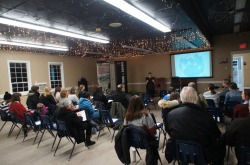The hard science of a plastic problem

MUN Sociology's Dr. Max Liboiron's work on marine plastics in Newfoundland fish was recenlty featured in The Telegram, the Muse, and CBC radio because of new findings about plastic pollution in Newfoundland.
Dr. Liboiron and her students have found one of the lowest plastic ingestion rates ever recorded. Below is an excerpt from The Telegram:
"In 2015, Liboiron’s team looked inside 205 cod guts that came from Petty Harbour and St. Philip’s for micro-plastics, as well. “It was one of the lowest ingestion rates ever recorded in fish for plastic,” says Liboiron. Usually about 30 per cent of fish checked will have plastics in them. “Ours was 2.4 per cent, which is extremely low, which is very, very good news for the Newfoundland fishery,” Liboiron says."
Liboiron and her students presented the findings at a public meeting in Petty Harbour to recive feedback from the local fishing community and area where the cod fish were collected before publishing in academic journals.
For more information on this work, see Civic Laboratory for Environmetnal Action Research (CLEAR), or follow Citizen Science in Newfoundland on Facebook.